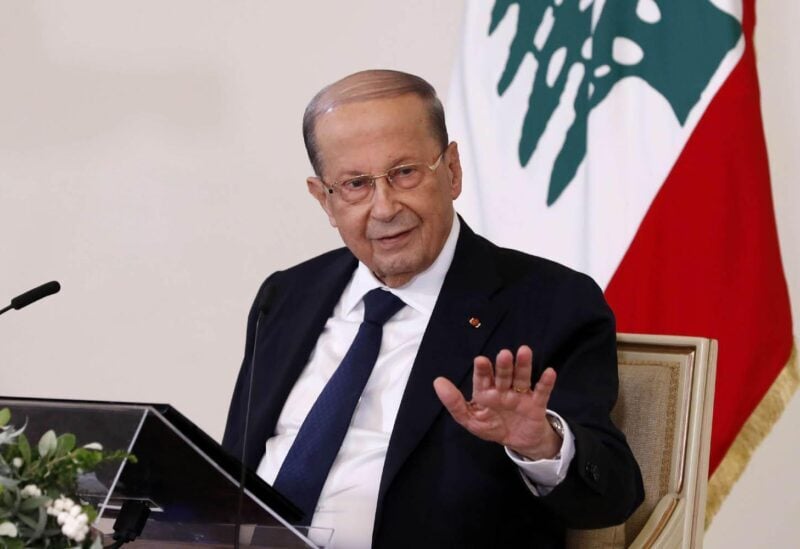
President Michel Aoun
Lebanon signed and delivered its copy of a US-mediated sea border deal with Israel on Thursday to a US mediator, hoping to soon start exploring gas in its southern maritime blocs to bring economic stability to the crisis-ridden country.
The agreement to demarcate the maritime border comes after months of indirect talks mediated by Amos Hochstein, the US envoy for energy affairs, and would mark a major breakthrough in relations between the two nations, which have formally been at war since Israel’s creation in 1948, AFP said.
Lebanon and Israel both claim around 860 square kilometers (330 square miles) of the Mediterranean Sea that are home to offshore gas fields. Lebanon hopes that demarcating maritime borders will pave the way for gas exploration to help lift it out of its crippling economic crisis, which has plunged three-quarters of its population into poverty. Israel hopes that the deal will reduce the risk of war with Lebanon’s Iran-backed militant group Hezbollah.
“This agreement was written with the idea in mind that it was between two countries that don’t have diplomatic relations,” Hochstein told reporters at the Baabda Presidential Palace. “I think the good will and good faith efforts by all parties is what’s going to make this move forward.”
Hochstein spoke after meeting with President Michel Aoun and senior officials and receiving Lebanon’s signed agreement. He is scheduled to meet with Speaker Nabih Berri before heading to the United Nations Interim Force In Lebanon headquarters in Naqoura by the southern border, where an Israeli and Lebanese delegation will separately deliver signed agreements and their finalized coordinates to the UN, before Hochstein meets with Israeli Prime Minister Yair Lapid.
Meanwhile, Lapid has signed the agreement. According to a statement from his office, a delegation led by the Energy Ministry’s director general is on its way to the signing ceremony in Naqoura at the border.
“There is a rare consensus in all security systems on the importance of the agreement,” Lapid said. The Israeli Cabinet approved the deal in a special session. “This is also an economic achievement. Yesterday, gas production began from the Karish Platform.”
Tensions briefly flared between Lebanon and Israel last summer, after Israel began drilling in the Karish gas field as negotiations took place. Prior to the agreement, Lebanon considered the area to be disputed, while Israel said it was part of its UN-recognized exclusive economic zone.
It was not immediately clear when drilling will begin, but cash-strapped Lebanon is hoping French oil giant Total will start soon after the agreement is signed and delivered by both parties.
Under the agreement, the disputed waters would be divided along a line straddling the “Qana” natural gas field. Gas production would be based on the Lebanese side, but Israel would be compensated for gas extracted from its side of the line.
President Aoun earlier this month in a televised address announced Lebanon’s approval of the sea border deal. The Israeli Supreme Court rejected four legal challenges against the deal, after its government also approved the plan.
In 2017, Lebanon approved licenses for an international consortium including France’s Total, Italy’s ENI and Russia’s Novatek to move forward with offshore oil and gas development for two of 10 blocks in the Mediterranean Sea. Novatek recently withdrew and officials, including Energy Minister Walid Fayad, have said that Qatar is interested in filling that gap.
“I truly believe and hope this can be an economic turning point in Lebanon for a new era of investment and continued support to lift up the economy,” Hochstein said.
Lebanon has since reached out to Syria and Cyprus to start direct negotiations over their northern and western maritime borders as well.